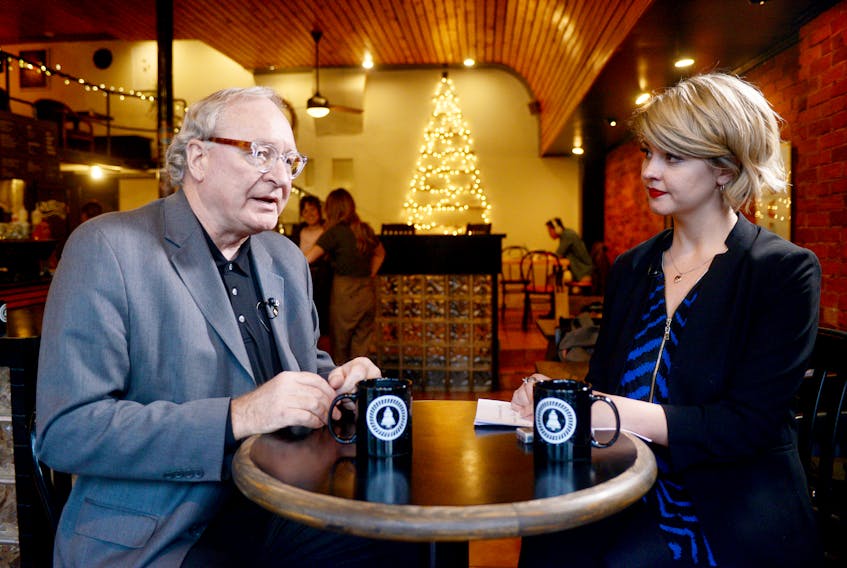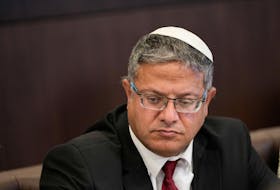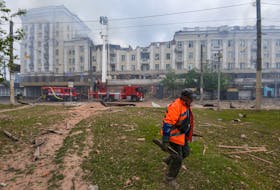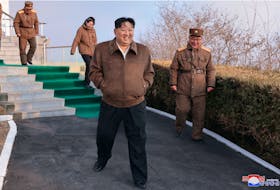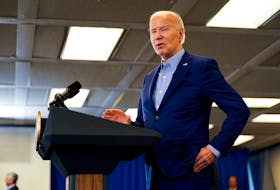P.E.I. Premier Wade MacLauchlan believes he has made better progress in leading the province than he expected to achieve by this point and dismisses any notion he should be worried about his political future, despite what polls might suggest.
In his year-end interview with The Guardian, MacLauchlan pointed repeatedly to the province’s population and economic growth over the last two years as key indicators that P.E.I. is not only doing well, but thriving.
He credited his government and leadership for helping to achieve this.
“The one thing more than any other that got me into public life was my concern about whether our combination of population and the economy was going to be sustainable. And when I look at this a little bit more than two years in, I’m very proud of where you are on both of those.”
He pointed to major strategic investments and legislative initiatives he has brought in since taking office, including bringing in a new Municipal Government Act, Water Act and making changes in the school system.
These structural changes are “putting in place the conditions for our province and our communities to do well in the long term,” he said.
“I wouldn’t have predicted that two years in we’d see our median age drop for the first time in 15 years and I actually wouldn’t have predicted that we’d be ahead of the norm for Canada in terms of our economy. Those are historic and they’re not only historic but they’re structural in the sense that we can continue building on that.”
Watch the year-end interview:
But in spite of the premier’s optimism, 2017 also saw a few political losses for his governing Liberal party — notably the loss of a veteran cabinet minister with the resignation of education minister Doug Currie and the subsequent loss of a seat in the District 11 byelection in Charlottetown.
The Liberals also saw their polling numbers dip to the lowest levels since 2004.
But MacLauchlan says he’s not worried.
“I don’t think I should be worried. I think I should be happy to do the job I’m doing, to have the chance to work with people of whatever stripe they’re wearing in a political sense.”
He also dismissed criticisms from the Opposition parties this fall that decisions such as the timing of the snap byelection and of funding announcements like the new Sherwood School were made for political reasons.
Rather, he says he is focused on improving the province as a whole and is happy with his progress to date.
“I actually think things are going better, probably, than I would have said we would be at this point, and I’m especially looking forward to the time ahead when we can do the things, take initiatives and make investments, where we can make an even bigger difference.”
FULL Q&A
School review
Q: This year saw a lot of concern about school closures. You decided against closing any schools. Was this a case of bowing to political pressure?
A: I wouldn’t characterize it as bowing to pressure, I would say that’s listening to Islanders. It became clear when we made that announcement we said, ‘This is not the time,’ it was most important to take account of what we had heard. And that’s really the key to all this.
Q. We saw numbers to suggest keeping some of these schools open doesn’t make sense given the demographics versus costs. Will we just be back here again in another few years?
A: When the school review process started, I would say the thinking was mainly about decline or about trends that seemed to be going down. And even within the last 12 months we’ve started instead, as a province, and in most parts of the province, to think about an opportunity. To grow, to expand our population, to encourage new people, younger people to stay around and start families. And that’s exactly, I would say, the spirit of the outlook today.
Mental health
Q: Earlier this year, the province’s chief mental health and addictions officer said the system is in “crisis.” Do you believe government is doing enough to address the pressures in mental health?
A: I would tell you, in response to those pressures and with the leadership of the health professionals, we’ve actually seen a number of innovations in this area. If we look at what’s taken place around the province – the school support teams… It’s remarkable to see the number of women who are getting help with mental health issues related to pregnancy through the women’s health centre. The walk-in clinics. The senior’s mental health teams that are available to work in homes or even to go into the communities. In those four initiatives about 1,200 Islanders have been served over the past 12 months. Yes there’s more to do, absolutely, and the way that we do that and do it best will be in working together and getting as far upstream as possible… And indeed related to that is the commitment to the mental health campus as a replacement for Hillsborough Hospital. And even thinking of it in those terms as opposed to, ‘Let’s build the next institution that replicates what we have.’ That has a whole outreach and serving the needs as we can best serve them today.
Q: A: We don’t have enough psychiatrists and psychologists to treat patients that are currently in the system. Is bricks and mortar where we should be dedicating resources?
A: You can’t do this without professionals, and indeed there is a competition – you can go to Cape Breton, you can go to downtown Toronto and there’s a big challenge and demand for psychiatrists and psychologists, so we have to think about how we can work together, and indeed, what we can do that will be attractive.
There’s no question that the need is there, people who are dealing with this in families or in communities or the individuals themselves, do indeed feel a great deal of challenge, of worry, of need and we understand that and we absolutely have to respond to that as a government and as a community.
Shift in political climate
Q: We saw the Green party gain another seat after the recent byelection in District 11. As the leader of the Liberal party what did you take away from this result?
A: I think you have to take it to heart. Of course, there were four candidates and one was going to win, people worked hard at the doors and in organizations, and voters chose Hannah Bell and that speaks to their preference… I think we accept it as a decision by the electors of District 11 and we certainly have a new dynamic here in the legislature.
Q: It feels like we’re seeing a shift in the dynamics of politics in P.E.I. What do you think is happening there?
A: I think at the most simple, it’s evident that we could have a two-plus party system, which indeed is a change in terms of who’s sitting in the legislature from what we’ve had for most of our time with a responsible government.
Q: Do you think there’s a difference in what people are looking for?
A: I think that people consider their options… And I think that overall the conditions in our province are positive, that people are doing well, there are more young people around. And it may well be that as the objective conditions for people to do well change or improve, they get some ideas of what government can do. And, frankly, as a premier or someone who is actively in the business of leading a government but also wanting to continue in government, we always have to be listening.
Election
Q: Recently in the legislature you were asked to commit to the fixed election date, but you didn’t exactly do that. Does that mean we’re going to have an early election?
A: What I did commit to is to go with the rules that exist for our election dates, it’s currently fixed for October of 2019, but even within the act itself there’s reference to what would happen if it was at the same time as a federal election. So this is a signal that we may indeed have to consider what are the best ways for Prince Edward Islanders to have a chance to express their view when they go to the polls in the next general election, but that’s all allowed for within the Elections Act.
Q: It’s allowed for, but are we going to see an election earlier than 2019?
A: What I will say, and have said, is that this will be done in terms of and in a way that’s consistent with the letter of the law and the spirit of the law, which is that Prince Edward Islanders should have a great general election at a time when they can best express their views.
E-gaming
Q: The e-gaming initiative was probed extensively this year and it just continues to come up. What do you think could be done to satisfy critics of the initiative and finally put this issue to bed?
A: When I think about this, I think it’s a good sign about how we’re doing as a government that people have to keep going back that far to find something that’s supposed to be that much trouble.
But the auditor general did look into this, at our request very soon after coming into government. She made 15 recommendations and then in her further report this year said we had acted on all 15 and we indeed have.
PNP
Q: Another issue that comes up continually is the Provincial Nominee Program. Recently concerns have emerged about the business stream of the PNP. Do you think this stream is working the way you’d like it to?
A: To be clear, we have acted to strengthen that program and strengthen that stream. We have put in place requirements and expectations that the intermediaries will work to bring people to the rural areas as well as the urban areas. We put in place a review in the third year for the people who would be the intermediaries, so it’s got to be about performance.
But ultimately, it’s not about the intermediaries, it’s about whether the people who come, come with a plan to be here in Prince Edward Island, and then they engage with our province and become of our province. And I’m also hopeful that as we move forward we find the results are already ahead of what those historic results have shown. That people are already engaged in a way that they are staying.
On being premier
Q: You’re at the halfway mark of your mandate. How has being premier changed you?
A: In some ways being premier is not different from jobs I’ve had before. They all have their challenges, they have their satisfactions… most of it comes down to: work, work, work. I’ll say this – the one thing more than any other that got me into public life was my concern about whether our combination of population and the economy was going to be sustainable. And when I look at this a little bit more than two years in, I’m very proud of where you are on both of those.
Q: Looking ahead to 2018, can you give us some an hint of something you have planned for the year?
A: I can tell you the two things that will require dedicated attention and will make the most difference in terms of our ability to keep on the positive path that we’ve been. One is workforce. We’ve got the lowest unemployment rate that we’ve seen in a long time with 2,700 new full-time jobs in the past 12 months. Now the challenge is to be sure that we’ve got the workers where there are needs… The second is housing. In a variety of ways, if we do the right things in housing we can really pull into the passing lane. If we just let supply and demand direct the way they will, we’re likely not going to meet all of our housing needs. So we’re creating a housing supply task force, we’ve got a leadership group there in the private and public.
Q: You’ve said before you would run in the next election, but the political climate has shifted since then. Do you still plan to run again?
A: Absolutely, sure. I look forward to it…There’s a lot more progress to be made and a lot more opportunity ahead and I want to be a part of that.

